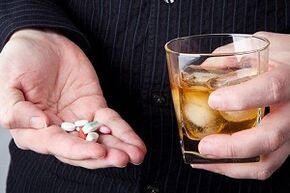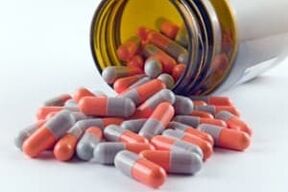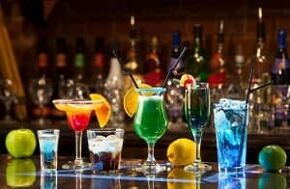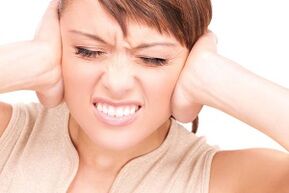Everyone knows that under any circumstances you can not combine alcoholic beverages and antibiotics, but now, treatment is over, and the last pill has been taken, and it is not clear how long to drink strong alcohol after taking antibiotics? If I wait a few days, or can I drink a few nights at the same time? To answer this question, you need to understand in more detail how antibacterial drugs and alcoholic beverages act on the body, and how long the treatment should last so that drinking is not harmful to health.
How many days after antibiotic treatment can you drink alcohol?

Drugs from this group are prescribed for the treatment of inflammatory diseases that can not be treated by the body itself. Antibiotics attack the pathogen, destroying its cell structure, so that the disease subsides and the patient feels better.
However, there is another side to taking antibacterial agents. Since their removal from the body falls completely on the liver, it must get a significant blow. Experts also prove that in people who use alcohol during antibiotic therapy, the effectiveness of its treatment is much lower than in patients who completely give up alcohol.
It all depends on the medication used for the treatment. It is best to check this question with your doctor. He will tell you in detail after how long you can go back to your normal way of life and consume alcoholic beverages. If unable to contact the doctor, then you can check the medication instructions carefully.
It must be marked there:
- Duration of treatment;
- This drug is compatible with ethanol;
- The period during which a person should not drink alcohol even after therapy ends.
Prohibition typically lasts from three to seven days. It all depends on the type of drug and the duration of its elimination from the body.
If the annotation does not contain information on the compatibility of the drug with alcohol at all, this does not mean you can start drinking immediately after the end of treatment.

In any case, it is recommended to wait at least a day to let the residual components of the medicine out of the body.
It is important to remember that although there is no mention of interactions with ethyl alcohol in the medication instructions, you should not drink alcohol immediately after antibiotics. This can harm the immature body after the disease and cause unwanted side effects.
What antibiotics should not be combined with alcoholic beverages?
Despite the doctor's ban, some patients undergoing treatment with antibacterial agents can still drink alcohol. At the same time, they do not even think about the possible consequences and refer to the fact that all the prohibitions of doctors are nothing more than unnecessary prevention. In fact, if the simultaneous use of alcohol and drugs does not affect the well-being of the patient in any way, this does not mean that everything goes without a trace.
The ethyl components of alcohol and drugs may not interact directly, but ethanol may reduce the therapeutic properties of the drug and its effectiveness. The disease will not subside anywhere and additional therapy is needed, which will cause a high load on the liver and other organs of the excretory system.
There is also a group of antibacterial drugs that are strictly prohibited from drinking alcoholic beverages. Information on the incompatibility with alcohol is indicated in the explanation of these drugs, in addition, the patient must be warned about this by the attending physician responsible for prescribing the drug.
Drugs that are completely incompatible with ethyl alcohol include:
- Tetrasiklin.They are widely used in medical practice for the treatment of various infectious diseases.
- Levomisetin.Drugs in this group by themselves can cause serious side effects, and concomitant consumption with strong drinks can exacerbate the toxic effects of the drug.
- Lincosamides.Drinking alcohol while taking this antibiotic has a negative effect on the central nervous system and liver.
- Aminoglycosides.Some of the strongest antibacterial agents do not work well with other drugs. The category is contraindicated for drinking alcohol during treatment with these drugs.
- Cephalosporins.Reactions such as disulfiram may occur due to the use of this drug in conjunction with alcohol. The person will experience severe symptoms of poisoning, which will lead to a significant deterioration in his or her health.
- Anti-tuberculosis antibiotics.
- Macrolides.The interaction of these substances with ethanol has a strong toxic effect on the brain and liver.
- Antibioticsare used in the treatment of leprosy.
There are several groups of antibacterial drugs, annotations that do not show how they interact with ethyl alcohol.
This medicine includes:
- Antifungal agent;
- Penicillin and other drugs.
The fact that the instructions for use do not contain information on the effects of combining these drugs with alcohol does not mean that their combination is justified. It should be noted that each person's body is unique, and a person after a combination of alcohol and antibacterial agents will remain safe and healthy, and someone will be at great risk.

So how long after treatment with antibacterial drugs can you drink alcohol? It all depends on the type of antibiotic and the physical condition of the patient. If the explanation shows that it is forbidden to drink alcohol while taking the drug, therefore, it is better to wait until the residual components of the drug are completely removed from the body. This usually takes about two weeks, so it is best to wait until the end of this period with alcohol.
If the instructions for the drug product do not show the details of its interaction with ethanol, then it is better not to drink alcoholic beverages at least three days after the end of therapy.
If you have any additional questions, you can contact your doctor. He will explain in detail whether it is possible to take alcohol while taking one or another antibacterial drug and will tell you how long after the end of therapy, it is better not to drink alcoholic beverages.
Possibly due to merger
Drinking alcohol after taking antibiotics can cause unwanted symptoms and negative side effects from the body. The fact is that there are a number of antibiotics that can block the breakdown of ethanol in the body. As a result, acetaldehyde stops being removed from tissues and organs, and begins to accumulate in it.
In this case, the body is poisoned and the person experiences painful symptoms of intoxication:

- Nausea and vomiting attacks;
- An unbearable headache that even painkillers cannot relieve;
- Dizziness;
- Difficulty breathing;
- Pressing chest pain;
- Skin redness;
- Sweating;
- Increase or decrease in blood pressure.
This is a far from complete list of the ill effects of alcohol and drug abuse.
It is important to remember that only a small number of antibiotics have been shown to be incompatible with ethanol in clinical studies to date. The rest is not yet fully understood, or is still in doubt.
In any case, one should be aware that strong drinking has a negative impact on the treatment process. Ethanol interferes with the normal absorption of the drug and reduces its effectiveness. Therefore, during therapy, you should refrain from drinking alcohol, even the weakest.
This will help you avoid unpleasant side effects and keep you healthy. However, no one can say for sure how the simultaneous consumption of alcohol and antibacterial agents will affect the health of certain people.
























